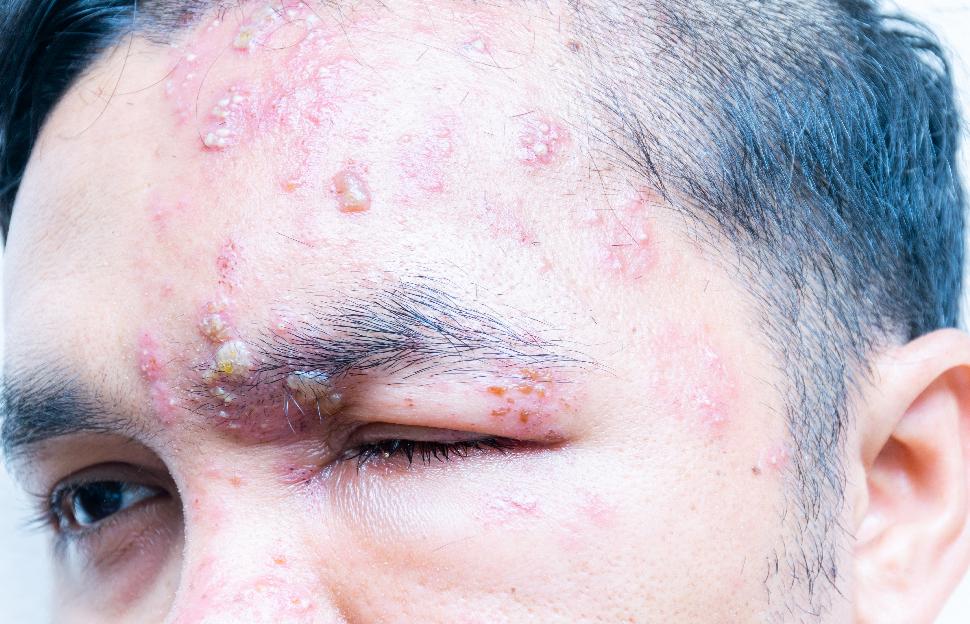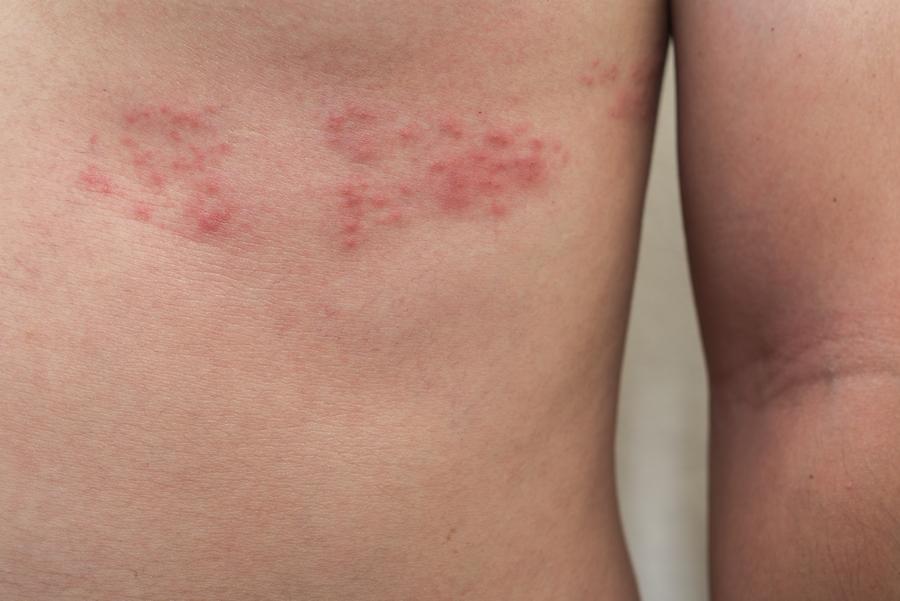Shingles Treatment (Herpes Zoster)
If you’ve ever had the chicken pox, you may be at risk for shingles. Shingles, or herpes zoster, is a viral infection during which a painful rash that can develop on one side of the face or the body. It’s caused by the Varicella Zoster Virus and can be spread from direct contact from rash blisters, though the spread in extremely limited once the blisters decrease or turn to scabs.
Though a person with shingles typically only has one episode in their lifetime, it can reactivate, particularly in those with high stress levels or a weakened immune system. Our office is here to provide you with information and helpful next steps for shingles symptoms you may be experiencing.
Shingles Symptoms
What are the symptoms of shingles?
The term shingles comes from the latin term cingulum, meaning “belt”, for its characteristic, single stripe rash around either the left or right side of the body. Sometimes, the skin rash can occur on the face, which can sometimes affect the eye and cause vision loss. In those with weakened immune systems, the shingles rash can be more wide-spread, appearing similar to that of a chickenpox rash.

Before the rash appears, shingles symptoms can include:
- Pain
- Itching
- Tingling
After the rash appears, shingles symptoms typically last two to six weeks and can include:
- Fever
- Headache
- Chills
- Upset Stomach
Shingles Treatment
What is the treatment for shingles?
If you are experiencing symptoms of shingles, it is important to contact your health care provider within the first 72 hours. Our office is available to answer any questions you may have.
Several antiviral medications can be used to treat shingles. For shingles pain relief, pain medication (either over-the counter medication or prescription strength) is often recommended, and can be used in combination with a variety of home remedies. For those experiencing severe pain after the rash clears, Dr. Green may prescribe one of the following:
- Capsaicin topical cream or patches
- Anticonvulsants, like gabapentin (Neurontin) and pregabalin (Lyrica)
- Tricyclic antidepressants, like amitriptyline and nortriptyline
- Antibiotics (in rare cases)
Antiviral Treatments
Which antiviral medications treat shingles?
Antiviral medication is a typical treatment for shingles, which can shorten the length and severity of the symptoms, preventing the severe pain often associated with Varicella Zoster Virus. Antiviral medication can be prescribed and are most effective when taken at the first sign of a shingles rash. Common antiviral drugs include:
- Acyclovir (Zovirax)
- Valacyclovir (Valtrex)
- Famciclovir (Famvir)
Home Remedies
What are the home remedies for shingles?
A combination of wet compresses, calamine lotion, and colloidal oatmeal baths can be used to reduce itching and discomfort while experiencing shingles. Numbing agents, such as lidocaine, can also be applied as a lotion, gel, spray or skin patch, to reduce irritation. Also, reducing stress in your life and routine can help to reduce painful shingles symptoms.
What are the complications of shingles?
According to the Centers for Disease Control and Prevention (CDC), The most common complication of shingles is Long-term Nerve Pain, or postherpetic neuralgia (PHN). PHN affects between 10 and 18% of those who have shingles, and risk increases with age: those above the age of 60 are at greater risk for PHN, and those under the age of 40 rarely experience symptoms of PHN.
In rare cases, shingles can have serious complications such as:
- Vision Loss/Blindness
- Pneumonia
- Hearing Problems
- Bacterial Infection of rash blisters
- Brain Inflammation (encephalitis)
- Disseminated zoster, where the rash affects multiple skin surfaces
If you have severe symptoms of shingles, it is important to contact to your health care provider.
Postherpetic Neuralgia
What is the treatment for PHN?
Research is ongoing on the Varicella Zoster Virus through the National Institute of Neurological Disorders and Stroke, but PHN is thought to occur due to damaged nerves within the site of a shingles rash.
The best treatment for PHN is that of preventative care. PHN can be prevented by taking an antiviral drug within the first 72 hours that a shingles rash appears. Over-the-counter pain medications such as ibuprofen (Advil) and acetaminophen (Tylenol) can also reduce the risk of postherpetic neuralgia.
If you’re experiencing pain and discomfort long after a shingles rash disappears, you likely have PHN. Treatments for PHN include topical numbing creams, antiseizure medications, tricyclic antidepressants and, in extreme cases, prescription pain medication.

If you’re experiencing extreme symptoms of shingles, or persistent shingles pain after the shingles rash has disappeared, contact the office as soon as possible to determine the best course of care.
What are the risk factors for shingles?
Anyone who has had a natural chickenpox (varicella zoster virus) infection or had a varicella vaccination (such as the chickenpox vaccine) can develop shingles. However, children who are naturally infected with varicella zoster virus are far more likely to develop shingles in their lifetime than those who get a vaccine. In the United States, approximately 1 in 3 people will have a shingles episode, and more women than men are regularly affected by herpes zoster.
People with compromised or suppressed immune systems are at higher risk for both a shingles episode and reactivation of shingles symptoms. Furthermore, those with weakened immune systems and those above the age of 50 are more likely to have longer lasting cases of shingles and severe complications, making it all the more important to seek early treatment of any symptoms. Increased risk factors are common in those with:
- Cancer (particularly leukemia and lymphoma)
- Human Immunodeficiency Virus (HIV)
- Blood marrow or organ transplants
- Necessary immunosuppressive medications
- Autoimmune disorders, like arthritis, lupus, or Crohn’s disease
Psychological and emotional stress is also thought to be a factor in the development of a shingles episode.
Shingles Vaccine
Two different herpes zoster vaccines are licensed and recommended for preventative use.
The first, commonly referred to as Shingrix, is the preferred vaccine for people over the age of 50 who aren’t immunocompromised. A combined two doses of Shingrix is more than 90% effective at preventing both shingles and PHN.
The second, referred to as Zostavax, is less commonly used, but can still be used to prevent shingles in healthy adults age 60 and older.
Side effects for both vaccines tend to be very mild. Shingrix can cause swelling and muscle pain around the injection site, as well as muscle aches and fever in rare cases. Zostavax is a live virus vaccine, so it may cause a small, chickenpox-like rash around the injection spot.
Who should get the Shingles vaccine?
A shingles vaccine can be helpful for anyone with risk factors for shingles. For those who are above the age of 50, a shingles vaccine is largely recommended in the United States in order to prevent shingles episodes and complications.
For additional information and to book an appointment, contact us online today or call Dr. Michele Green’s NYC based office at 212-535-3088
 212-535-3088
212-535-3088